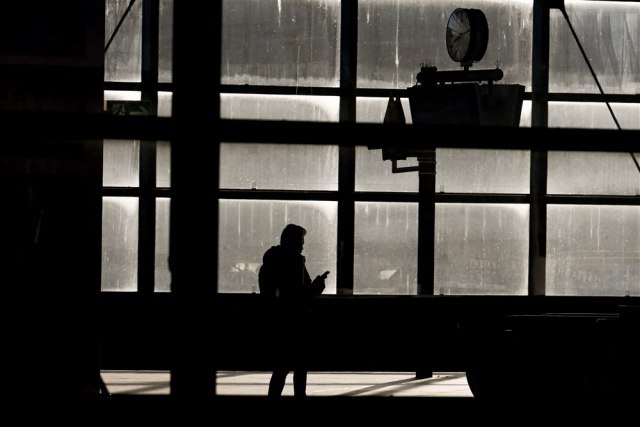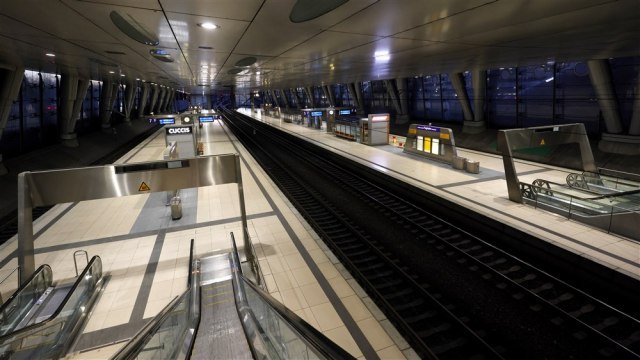Unprecedented in the last three decades: Total traffic collapse in Germany VIDEO
Today, a one-day general strike in the transport sector began in Germany, completely paralyzing rail, air and sea traffic.
Monday, 27.03.2023.
10:28

Unprecedented in the last three decades: Total traffic collapse in Germany VIDEO
Members of the United Services Trade Union Ver.di (Vereinte Dienstleistungsgewerkschaft) and the railroad workers' union are on strike. The strike affected all intercity rail traffic, almost all city traffic as well as most airports. The strike also covers maritime traffic in Germany as well as highways.Unions are demanding higher wages, especially equalizing the negative effect of inflation on real wages. The Ver.di trade union for 2.5 million employees is asking for increases of 10.5 percent.
Traffic collapse
According to data from the Association of Airports, 380,000 passengers could be affected by the strike today, and traffic is expected to be disrupted until the middle of the week.A representative of German Railways (DB) urged passengers to postpone their journeys if possible or to reschedule them.
Given that German highway employees are also participating in the strike, there are fears of major delays on Monday due to overloading, as well as the closure of the tunnel, which will not be monitored due to the strike.
Criticism of the scope of the strike
The Union of German Cities and Municipalities, which appear in the role of employer in collective bargaining negotiations with the Ver.di union, criticized Monday's strike, particularly because of its scope."Monday's strike takes on the dimensions of a general strike, and due to its scope, it is difficult to talk about a warning strike," said the president of the Union of German Cities and Municipalities, Gerd Landsberg, in an interview with the "Rheinische Post" newspaper, reports Index.
Landsberg also criticized the timing of the strike on the very day when negotiations between employers and unions on a new collective agreement were supposed to continue.
German government does not want to interfere

"The right to strike is one of the fundamental rights in Germany," said the Spokesperson of the German government, Steffen Hebestreit. He also appealed to the participants in the negotiations to find a solution as soon as possible so that the impact on the everyday life of citizens is as small as possible.
More than 30 thousand railway workers are on strike
More than 50 protest rallies will be held throughout Germany during the day. According to the EVG railway union, more than 30,000 workers at around 350 locations across Germany went on strike in the early morning hours."Germany is standing still because the employers are rejecting the deal," said EVG collective bargaining board member Christian Laroche.
The airport in Frankfurt is also closed, along with kindergartens and schools.
"Strike is a matter of survival"
The leader of Germany's Ver.di service union, Frank Wernecke, said the strike was a matter of survival for thousands of people fighting for higher wages as inflation rises.According to the announcements of the trade unions, almost everything will stop in Germany, Deutsche Welle reported.
The biggest strike in three decades will leave millions of people without regular transport and roads are likely to be jammed with cars.
Such a warning strike was called by two important trade unions, the Union of Railway Workers and Transport Employees (EVG) and the Service Union "Ver.di".
Unions want higher wages in view of price increases, as well as better working conditions for around 2.7 million employees in the public sector and transport activities.
"Ver.di" is asking for 10.5 percent more for public servants, whose salaries are equal to the salaries of many employees at airports or in public transport, but so that the minimum increase is 500 euros per month gross.
The employer's offer that the increase amounts to five percent in two steps, and that it be paid once for 2,500 euros, was rejected.
The German Railways and about fifty other railway companies offered the same to the EVG union.
EVG refuses, demanding 12.5 percent more salary, and at least 650 euros per month.
A poll by the public opinion research agency YouGov shows that 55 percent of citizens support the strike.
It was announced that it will last one day and that the situation will be normalized on Tuesday.
















Komentari 3
Pogledaj komentare